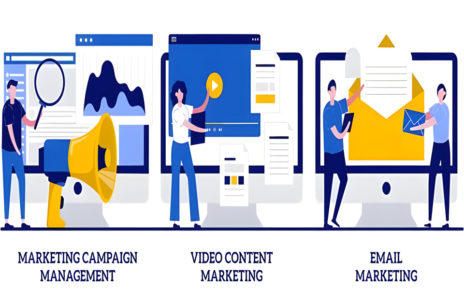In today’s digital age, software as a service (SaaS) companies have emerged as frontrunners in providing innovative solutions to modern business challenges. However, even the most groundbreaking SaaS offerings can fall short of reaching their full potential without a robust digital marketing strategy. In this blog post, we’ll look into the importance of digital marketing for SaaS companies and explore how they can harness its power to thrive in the competitive market.
Understanding Digital Marketing for SaaS Companies
Before we go into the details, let’s clarify what digital marketing entails. Digital marketing is the practice of using various online channels to promote products or services, reach a wider audience, and engage potential customers. For SaaS companies, digital marketing serves as a bridge between the technical brilliance of their software and the target audience that stands to benefit from it.
The Importance of Digital Marketing for SaaS Companies
- Increased Visibility and Brand Awareness: Imagine having the most ingenious software solution that no one knows about. That’s where digital marketing comes in. By utilizing strategies like search engine optimization (SEO), social media marketing, and content creation, SaaS companies can increase their online visibility and build brand awareness. This means potential customers are more likely to come across their offerings when searching for solutions to their problems.
- Targeted Reach: Digital marketing allows SaaS companies to precisely target their audience based on demographics, interests, behaviors, and other criteria. This means you’re not wasting resources reaching out to individuals who have no use for your software. Instead, you’re focusing on those who are most likely to convert into customers.
- Lead Generation and Customer Acquisition: In the SaaS world, lead generation is the lifeblood of growth. Effective digital marketing strategies can drive traffic to your website and convert visitors into leads. Through tactics like gated content (e.g., eBooks, webinars) and compelling calls-to-action, you can capture valuable contact information from potential customers, enabling you to nurture these leads into paying users.
- Educational Content Sharing: SaaS products often require a certain level of understanding for users to fully utilize their potential. Digital marketing offers a platform to share educational content such as blog posts, video tutorials, and guides. By educating your audience, you’re not only demonstrating your expertise but also helping users maximize the value they get from your software.
- Building Trust and Credibility: Trust is a vital factor in the SaaS industry. When potential customers see consistent and valuable content being shared by your company, it builds trust and credibility. Customer reviews, case studies, and testimonials can also be effectively showcased through digital marketing efforts, reinforcing the reliability of your software.
- Data-Driven Decision Making: The beauty of digital marketing is the ability to measure and analyze the effectiveness of your strategies. With tools like Google Analytics, you can track metrics such as website traffic, conversion rates, and user behavior. This data provides insights into what’s working and what’s not, allowing you to make informed adjustments to your marketing approach.
Strategies to Leverage Digital Marketing for SaaS Companies
- Content Marketing: Creating valuable and informative content is a base of digital marketing for SaaS companies. Start a blog on your website and share articles, infographics, and videos that address pain points your target audience might have. This not only establishes your authority but also attracts organic traffic through search engines.
- Social Media Marketing: Choose social media platforms where your target audience is most active and engage with them through relevant content. Share updates, customer success stories, and behind-the-scenes glimpses of your company culture. Social media is also a great place to run targeted ads to reach potential customers.
- Search Engine Optimization (SEO): Optimize your website for search engines to increase its visibility in search results. Use relevant keywords, create high-quality backlinks, and ensure your website’s structure is user-friendly. Appearing on the first page of search results can significantly boost your website traffic and lead generation.
- Email Marketing: Email is a powerful tool for nurturing leads and staying connected with your user base. Send out newsletters, product updates, and personalized content to keep your audience engaged. Just be sure to provide value rather than inundating their inboxes with promotions.
- Paid Advertising: Invest in paid advertising to reach a broader audience quickly. Platforms like Google Ads and social media platforms offer targeted advertising options that allow you to reach specific demographics. Be sure to design compelling ad copy and visuals to entice clicks.
- Influencer Collaborations: Collaborate with industry influencers or thought leaders who can endorse your SaaS product. Their endorsement can introduce your software to their followers, expanding your reach and credibility.
- Customer Engagement: Engage with your customers on social media and other online platforms. Respond promptly to inquiries, address concerns, and celebrate user success stories. This interactive approach not only improves customer satisfaction but also showcases your commitment to customer support.
In Conclusion
Digital marketing is not just a tool; it’s a necessity for SaaS companies looking to thrive in a competitive landscape. It serves as a bridge that connects your innovative software solutions with the audience that can benefit from them the most. By implementing a well-rounded digital marketing strategy that includes content creation, social media engagement, SEO, and more, SaaS companies can increase their visibility, attract leads, build trust, and ultimately drive business growth. Remember, in the digital age, success isn’t just about having a great product – it’s about effectively getting that product into the hands of those who need it.




